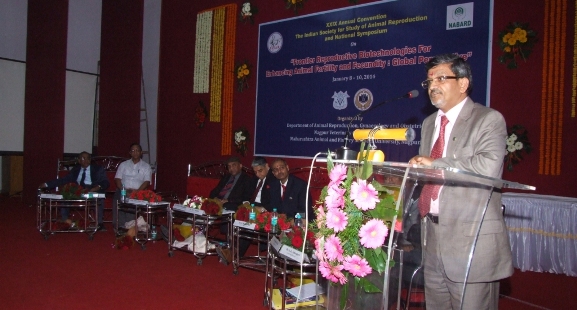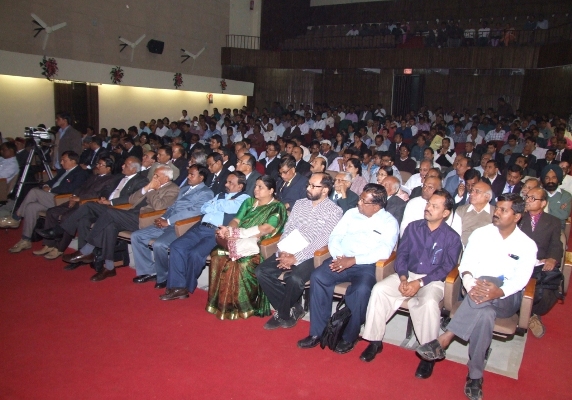Speakers at the 29th Annual Convention of Indian Society for Study of Animal Reproduction pointed out the need to chalk out plans for meeting the growing demand for milk and meat with a focus on improving milch animal productivity and increase milk production for the booming population. It needed research in livestock and animal reproduction science on the very lines of other National Institutes.

The three-day 29th Annual Convention of Indian Society for Study of Animal Reproduction (ISSAR) got underwayon Wednesday, (January 8, 2014) at Nagpur Veterinary College, Seminary Hills, Nagpur under auspices of Maharashtra Animal & Fishery Sciences University (MAFSU).
The chief guest Dr Suresh Honnappagol, Commissioner, Animal Husbandry, Ministry of Agriculture, Government of India, who inaugurated the Convention, stressed the crucial point on setting up of ‘National Institute of Animal Reproduction’ in the country for research in livestock and animal reproduction science on the very lines of other National Institutes. “There is a need to enhance high yielding cattle. Research has to be intensified in the area of production of cattle of the best breed,” said Dr Honnappagol at the National Symposium on “Frontier Reproductive Biotechnologies for Enhancing Animal Fertility and Fecundity: Global Perspective”.
Dr. Honnappagol urged the gathering at the Convention to chalk out plans for meeting the growing demand for milk and meat with a focus on improving milch animal productivity and increase milk production for the booming population. The Government has approved National Dairy Plan Phase-I (NDP-I) in February, 2012 with a total investment of about Rs. 2242 crore to be implemented from 2011-12 to 2016-17. NDP-I will help meet the projected national demand of 150 million tonnes of milk by 2016-17. He emphasized that, for cow or calf producers’ point of view, reproductive efficiency is a crux for economic viability. However, very few producers take advantage of available reproductive technologies that can increase profitability.
“At present, the incremental milk production has been around 3.5 metric tonnes a year while demand is growing at almost double the pace with 6 metric tonnes per year. Even today, per capita milk consumption in India is lower than the world average of 285 gm per day. Part of the problem lied with the low yield per animal by our main milk providers i.e. crossbreds and buffaloes. Animal reproduction is one of the important considerations in the economics of the livestock production. Cattle productivity depends largely on reproductive efficiency. Animal fertility is a measure of reproductive success,” Dr. Honnappagol stated.
Dr M L Madan, Chairman, Livestock Subgroup Haryana Farmers Commission, in his address, informed that the contribution of livestock in agriculture sector is much greater than crop and forestry. The growth of agriculture sector has mainly been complemented by the livestock sector i.e. up to 45 per cent. Recognizing the importance of livestock sector, Government of India has initiated funding scheme such as Rashtriya Krishi Vikas Yojana (RKVY). He further added that in India, 68% of livestock holders are either marginal or the landless farmers, and the majority of the grants from Government goes to the agricultural farmers and not to the animal keepers. Hence, the marginal land holders or landless livestock keepers remain deprived of any monetary benefits.
Prof Madan said that, “if scientists implement advanced biotechnological tools for improving animal fertility, we can achieve livestock growth at the pace of 7 per cent, if, coupled with proper vaccination and nutrition, it can pace up to 23 per cent. The lesser the reproductive efficiency of livestock, more the poverty and more the reproductive efficiency of livestock the lesser the poverty.”
Prof. A. K. Mishra, Vice-Chancellor of MAFSU said, “The University is poised to set a lofty benchmark in the field of Veterinary, Dairy and Fishery Research. The University has set a role of researchers at high pedestal to gear up the research which would facilitate the farmers and livestock owners to augment their income and make them economically sound. Although, India is having highest cattle and buffalo population, second and third highest goat and sheep population respectively in the world, the production is not at par due to less productivity of an individual animal. In order to discuss the prospects of implementation of advanced biotechnological reproductive tools for augmenting reproductive efficiency of elite animals and wild animals, MAFSU has decided to organize the symposium under auspices of Indian Society for Study of Animal Reproduction (ISSAR). It is need of the hour to review present options in Reproductive Biotechnology for optimizing Reproductive Efficiency of animals by adopting emerging biotechnological tools such as embryo transfer, sexing of semen, cloning, transgenesis, stem cell research for faster multiplication of elite animals and improved artificial insemination and controlled breeding to enhance reproductive efficiency,” Prof A K Mishra said.
Earlier in the day, the Convention was inaugurated by Dr. Suresh S. Honappagol, Commissioner, Animal Husbandry, Ministry of Agriculture, Government of India, New Delhi as chief guest and Dr. M.L. Madan, Chairman, Livestock Subgroup, Haryana Farmers Commission & Ex-DDG (Animal Science), ICAR, New Delhi and former Vice-Chancellor, Dr. Panjabrao Deshmukh Krishi Vidyapeeth and also Pandit Deen Dayal Upadhyaya Pashu Chikitsa Vigyan Vishwavidyalaya Evam Go Anusandhan Sansthan, Mathura, Uttar Pradesh as Guest of Honor. The Vice-Chancellor of MAFSU Prof. Aditya Kumar Mishra was the Patron, whereas Dr. S. A. Bakshi, Chairman, Dr. C.R. Jangde, Co-Chairman and Dr. S. K. Sahatpure, Organizing Secretary of the Convention, Dr. D. S. Prakash, Additional Director General, Animal Nutrition, ICAR, Dr. S K. Agarwal, President, ISSAR and Dr. Shiv Prasad Maurya, General Secretary, ISSAR graced the occasion.




















